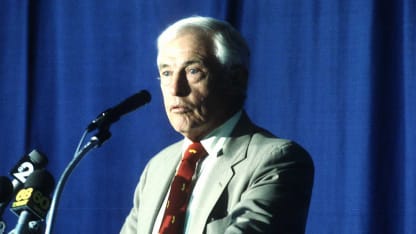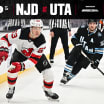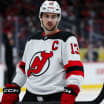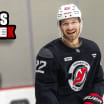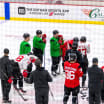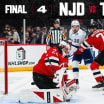Let's put it this way - without Dr. John McMullen there never would be a New Jersey Devils and perhaps never be major league hockey in the Garden State.
The Maven can assure you of this fact because I was there 42 years ago when the good doctor resuscitated a franchise that previously had lost its breath in Kansas City and then Denver.
But McMullen had the faith the others lacked that big-league hockey could succeed in the Garden State. When he took over the team prior to the inaugural 1982-83 season, there were skeptics to be sure but Navy Man that he was, Doc Mac put the "Anchors Aweigh" theme to practical use with two words - "CAN DO!"
It was a mantra taught to him as a youth in Jersey City and gradually grew from there. But by no means did Mac's success emerge overnight; rather his admirable \persona \continued growing in Montclair where he was a star athlete and student at Montclair High School.
His kinship with the sea was accentuated at the U.S. Naval Academy in Annapolis where he received a B.S. degree in Electrical Engineering in 1940. With his diploma in hand he heroically served in the U.S Navy during World War II. John remained a Navy man until 1954 when he reached the rank of commander.
During naval service he earned a Master of Science degree in Naval Architecture and Marine Engineering from M.I.T and a Doctor of Mechanical Engineering degree from the Swiss Federal Institute of Technology in Zurich.
McMullen converted his knowledge into a highly successful business venture in 1957 when he built a naval architecture and marine engineering concern, John J. McMullen Associates.
"Throughout my growth," he asserted with the utmost conviction, "I maintained my love of New Jersey. I took pride in my development and continued my sporting background both playing for and watching local teams."
That helps explain his enthusiasm when news of the Colorado Rockies NHL team's availability reached his ears.
"He became convinced that the state of New Jersey could support an NHL team at The Meadowlands," said Lou Lamoriello who would become Doc Mac's closest associate in developing the Devils into hockey champions. "Others may have doubted it but he made it happen."
On May 27, 1982 it became official. Along with investor John C. Whitehead and former New Jersey governor Brendan T. Byrne, he bought the Rockies and received permission to move the franchise from Denver to The Meadowlands.
"Once all the papers had been signed," Doc Mac chuckled, "the response was wonderful, but I found that building a hockey team wasn't as easy as signing on the dotted line." There were all kinds of bills to pay and with that, the new owner displayed his inimitable sardonic sense of humor.
"The alternative (to paying the bills) was no team," he laughed. "It was like deciding what's better, than not being alive! " Then, a pause: "The alternative was terrible. There was no other way."
Thus, he paid an unprecedented NHL transfer fee not to mention a territory price for "invading" the Rangers turf. That indemnity paid to the Blueshirts would prove to be a preface to the rivalry with the Rangers often described as "The Battle of the Hudson."
The Devils first radio play-by-play man Larry Hirsch got a good whiff of Mac's feeling about the Rangers. "He once warned me not even to mention their (Rangers) name during my broadcast," said Hirsch. "And he meant it."
Granted it required time - and painful losses - to reach the Rangers' success level. In fact, it wasn't until someone tipped off John that the best man to orchestrate his Devils symphony was running the Providence College athletic program - Lou Lamoriello.
"Bringing in Lou was one of my wisest moves," McMullen averred. "Nobody worked harder - I mean 24 hours - in what was supposed to be an eight-hour day. Did I ever get my money's worth from Lou? You bet I did!"
Lamoiello took over before the 1987-88 season. Early in January he replaced coach Doug Carpenter with Jim Schoenfeld and added Canadian Olympic goalie Sean Burke to the roster.
"With Schony doing the stirring and Lou overseeing the long-awaited renaissance," wrote a New Jersey journalist, "the formula was sensational."
In a most melodramatic turn of events, Schoenfeld's exciting sextet knocked the Rangers out of a playoff berth on the final night of the season. From there the Devils made beautiful music for sellout crowds at the Meadowlands Arena.
"Our young players like John MacLean, Pat Verbeek and Doug Brown were coming through," exulted Mac. "And what a wonderful playoff run we had."
It started by knocking off the first place NY Islanders, then the Washington Capitals, then taking Boston to seven games before losing the third playoff round. By that time they were the toast of the Met Area, even commanding attention from Newsday columnist Joe Gergan who lauded the Devils "talent, tenacity and exquisite timing."
McMullen devoured the positive aura delivering handshakes as he toured his winning dressing rooms. "It's a terrific feeling," he explained, "but we're still aiming for the ultimate prize - the Stanley Cup - and I'm sure that Lou will find the necessary ingredients." Then a pause. "The right guy to lead this team all the way."
The "right guy" was former Montreal Canadiens Hall of Famer Jacques Lemaire.
In June 1993 Lemaire was named head coach of the Devils with McMullen's blessing. "It was a brilliant move," said veteran center Bobby Holik. "Jacques turned out to be the best coach I ever had."
Time and again McMullen shared his enthusiasm with his close pal, baseball hero Yogi Berra.
Their friendship had begun when McMullen owned the Houston Astros and Berra was his manager. Yogi, who loved hockey since his St. Louis childhood, not only watched games with his buddy, he worked out with him.
"I built a new training facility at our practice rink in South Mountain Arena," said Mac, "and early every morning Yogi and I would get our exercise together."
Mac loved talking Yankees with Yogi, especially when the subject was notorious Bombers boss, George Steinbrenner. As a matter of fact, one of McMullen's classic lines emerged when a reporter asked him what it was like to be a "limited partner" with Steinbrenner; which once was the case. In return, Mac delivered the perfect squelch:
"Nothing is so limited as being one of George's limited partners."
Speaking of partnerships, none were more loving than John and his lovely wife, Jacqui.
Together they supported innumerable charitable organizations as the U.S. Naval Academy Foundation Mac was honored by the Naval Academy for his naval and hockey background by Annapolis, naming Navy's hockey rink after him.
Then there's Boston College's McMullen Museum of Art which features much of John's collection of naval art and which I had the good fortune to view at his home as well.
But our relationship was focused on hockey and it always was a kick for me to interview him at his office with his pet retriever Bubba at his side (John loved to feed Bubba fresh bagels.) Occasionally we would watch Lemaire's practices and wonder when - if ever - the Stanley Cup would arrive in New Jersey. By the 1994-95 season the French-Canadian coach had sculpted a winner and in June 1995, McMullen was presented with the Stanley Cup.
However, the triumph had a bitter-sweet tinge to it. Over the years, McMullen had become disenchanted with the New Jersey Sports Authority which had jurisdiction over the Devils' home rink. The feud sizzled in 1994 and dangerously flamed in early 1995 when Doc Mac considered a lucrative offer to move the franchise to a new arena in Nashville.
But when Lamoriello's team began its relentless march to its first Stanley Cup, McMullen's negotiating position became stronger with every series victory. After his Devils knocked off the Philadelphia Flyers in the third round of the 1995 tournament, a reporter asked Doc Mac the "meaning" of the victory.
Pointing a finger at Lou while thinking how the Authority battle had swung in his favor, McMullen chirped, "The meaning of it is that Lou is one hell of a negotiator!"
Sure enough, when the negotiations had ended, Doc Mac - thanks to Lou's championship team - won a sweetheart deal that most importantly kept the Devils in New Jersey, not Nashville.
What also was evident by this time was the smooth manner in which the owner and general manager integrated their roles. Doc Mac stayed out of the hockey end of business - unless asked - while giving Lou full authority to make his purely hockey moves.
As much as he was satisfied having one-upped the Sports Authority, McMullen wanted most of all to have an arena of his own. He was as intensely serious about this as any of his passions be they family, hockey or baseball.
Relying on his own professional knowledge of construction, Mac hired the best architects and planners and designated a patch of unused Hoboken waterfront as the potential site. Since this was a big story for the SportsChannel network that carried the Devils telecasts, I was assigned to do feature segments as Doc's plans were made public.
Having visited the waterfront site and seen the blueprints, I was certain that John would develop a magnificent ice palace and with much of his own funds to make it work. It was during these Hoboken visits that I met Robert (Bob) Drasheff, who was Mac's close consultant on the project and who became a good friend of The Maven.
From my viewpoint, no single person was able to discern the qualities that made McMullen so successful and admired than Bob Drasheff. When I asked Drasheff the simple question - "What made this unique individual tick?" his answer was as straightforward as the subject in question.
Drasheff: "John McMullen was the most honest and straightforward person I ever met. He always tried to see the best in someone and had a knack for recognizing their potential as well. He was a brilliant scientist and engineer who never boasted about his accomplishments unless asked.
"He was a man who dined with Presidents but never forgot his modest background and birth in Jersey City. And he was just as comfortable at eating at the local hot dog stand as he was at dining at the 21 Club."
I can vouch for that. Doc frequently invited me to schmooze with him at his favorite Montclair diner. Another time - we were discussing the possibility of my helping him write his memoirs - we had lunch at the swankiest restaurant atop the World Trade Towers.
Near the turn of the century, Lamoriello had crafted another strong NHL entry and delivered a second Stanley Cup to his boss in 2000. Not long after his Devils knocked off the Dallas Stars, McMullen sold his team to a group headed by none other than Yankees owner George Steinbrenner.
The sale didn't in any way dilute John's intense interest nor love of the hockey club. In 2016, he was inducted into the New Jersey Ice Hockey Hall of Fame, not to mention the hockey club recognizing his contributions as the first individual awarded the Devils Medal of Honor.
The masterful father of major league hockey in New Jersey died on September 18, 2005.
His funeral attracted mourners from all over the continent. The encomiums were touching and endless, especially from players who acknowledged that Doc Mac was the best owner a hockey player could ever have. And for good reason.
"John McMullen always thought of the Devils team members and staff as part of his family," concluded his close friend Drasheff, "and he got to know nearly all of them on a personal level."
And so did I and so did Lou, and the bottom line was that we loved that man.

